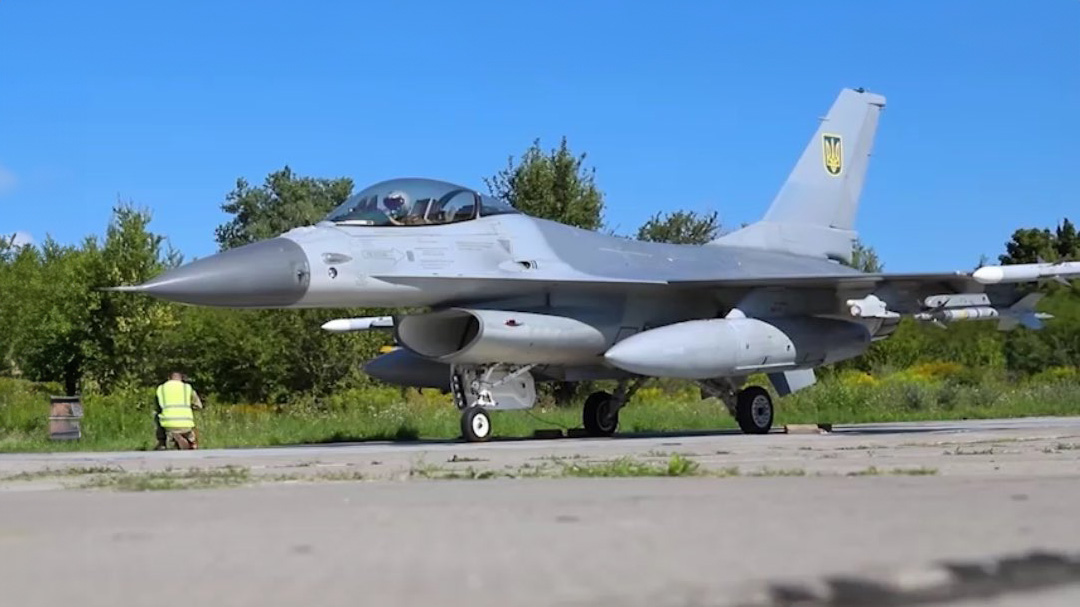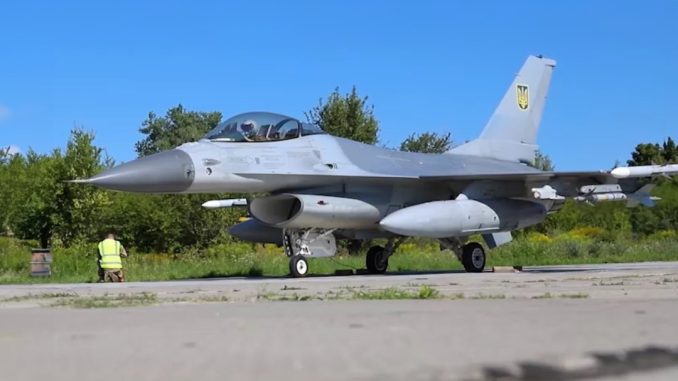Breaking: One Of The First F-16 Jets Transferred To Ukraine Has Crashed


The Ukrainian Air Force has lost one of the first six F-16 jets it has recently received.
A Ukrainian Air Force F-16 fighter jet was lost in a crash on Monday, Aug. 26, 2024, a U.S. official told the Wall Street Journal. Preliminary information suggests the jet was not brought down by enemy fire: the crash is believed to have been caused by pilot error.
BREAKING: A Ukrainian F-16 fighter jet was destroyed in a crash on Monday, per U.S. official, just weeks after the first of the American-made aircraft arrived in Ukraine.
The Ukrainian Air Force would not confirm the crash or the status of the pilot. https://t.co/Vfc4JVISbk
— Lara Seligman (@laraseligman) August 29, 2024
Noteworthy, the incident coincided with a large-scale Russian missile strike across the country, with a reported total of 127 missiles and 109 one-way attack drones including the Iskander-M/KN-23 GLBM (Ground Launched Ballistic Missile), Kinzhal ALBM (Air Launched Ballistic Missile), Kh-22/32 ALCM (Air Launched Cruise Missile), Kh-101 ALCM, 3M-14 Kalibr SLCM (Sea Launched Cruise Missile), Kh-59/69 ALCM and the Shahed-136 OWA-UAS (One-Way Attack UAS).
On that day, Ukrainian president Zelensky claimed that F-16s were involved in the defense and shot down an unspecified number of cruise missiles, although no further details were released. The F-16s delivered to Ukraine are currently outfitted with AIM-120B AMRAAMs, AIM-9L/M Sidewinders, and the internal M61 Vulcan 20 mm cannon—armaments previously used in similar defensive scenarios, such as in Israel. On the same day, the U.S. Air Force also announced its role in upgrading the electronic warfare (EW) systems of the F-16s delivered to Ukraine. The 68th Electronic Warfare Squadron, in collaboration with Danish and Norwegian partners, supported the delivery of these F-16s from Denmark and the Netherlands to Ukraine, as noted in a recent press release.
The news of the crash, first confirmed by a U.S. source to the WSJ but not yet confirmed or commented by the Ukrainian military had started circulating online on Aug. 28, 2024. Some users had noticed that Ihor Polishchuk, the mayor of Lutsk, had posted on social media that Ukrainian Air Force pilot Oleksiy “Moonfish” Mes had died on Aug. 26 while performing a combat mission. The post had been removed but it later emerged that “Moonfish” was one of the Ukrainian pilots trained on the F-16 in Denmark.
The fact that Oleksiy “Moonfish” Mes was among the first pilots trained on the F-16 doesn’t necessarily mean that he died in an F-16. The standard phrasing “died during combat mission” can refer to anything, he might as well have died in a missile attack on one of the air bases. pic.twitter.com/Ehlu4tvLnB
— The Military Watch (@MarcinRogowsk14) August 28, 2024
Although the news that “Moonfish” was killed in a crash, there are users who suggested the Ukrainian pilot lost his life in one of the “brand new” F-16s.
The loss of one of Ukraine’s limited F-16s is a significant setback for Kyiv, which had long lobbied for the jets before President Biden approved their transfer from European countries last year. While the Ukrainian Air Force has not specified exact numbers, a second U.S. official indicated that six jets have been delivered, with six Ukrainian pilots currently trained to operate them.
F-16 in Ukrainian Air Force service
After a prolonged wait, Ukraine finally received the initial delivery of F-16s from the international fighter jet coalition at the end of July. The news of the arrival of the jets in Ukraine was first reported by Bloomberg on July 31, 2024, and was later confirmed by a U.S. official to the Associated Press.
On Aug. 4, 2024, President Volodymyr Zelensky announced the arrival of Ukraine’s first batch of F-16 fighter jets. The delivery was celebrated with a private ceremony at an undisclosed location, where the aircraft were displayed alongside Zelensky and flew in formation overhead.
Reports indicate the first of up to 91 F-16s in both single-seat AM and twin-seat BM variants Kyiv is slated to receive, are former Dutch F-16s.
Photos released by the Ukrainian Air Force showed the jets equipped with AIM-120B AMRAAM and AIM-9L/M Sidewinder air-to-air missiles, as well as two external fuel tanks and Terma PIDS+ pylons with UV Missile Warning Sensors.
Zelensky emphasized that this transition to Western combat aircraft signifies a new era for Ukraine’s air force, achieved through significant diplomatic efforts. Previously dependent on outdated Soviet-era aircraft, Ukraine’s air force had been outmatched by Russia’s superior fleet, which has conducted extensive missile strikes and supported its eastern frontlines with precision-guided munitions.
The newly delivered F-16s are compatible with many Western weapons previously integrated on Ukrainian MiG-29s and Su-27s, promising improved operational efficiency. There are also indications that the F-16s might eventually be equipped with AGM-158 JASSM missiles.
These versatile F-16 jets are set to enhance and eventually replace the Soviet-era fighters, which had been modified to use Western-donated weapons like JDAMs, AGM-88 HARMs, ADM-160 MALDs, and Storm Shadow/SCALP-EG ALCMs, though these modifications have faced challenges.
The arrival of these F-16s marked a significant milestone for Ukraine, following months of anticipation. While the precise number of operational aircraft and their impact on Ukraine’s air defenses and battlefield capabilities remain to be seen, the F-16s are expected to initially serve an air defense role, with potential for air-to-ground operations in the future.
In June, Brigadier General Serhiy Golubtsov, the chief of aviation for the Ukrainian Air Force Command, outlined the expectations for the Western fighter jets. He noted that while the F-16s are crucial for maximizing the effectiveness of the Western weaponry already supplied to Ukraine, they should not be seen as a “magic solution” for achieving air superiority.
The General emphasized that air superiority cannot be achieved solely through these aircraft. Instead, it will require a broader, more intricate approach involving Electronic Warfare platforms and long-range radar detection systems, such as the Swedish ASC 890 Airborne Early Warning aircraft.
Losing a pilot
As with any aircraft, the F-16 is susceptible to being lost not only due to combat scenarios but also because of pilot error, particularly given the limited training that pilots have received. The introduction of the F-16s into active service was expedited, which means that the pilots may not have had extensive experience with the aircraft. This accelerated deployment increases the risk of operational mishaps, as pilots may still be in the process of fully mastering the complexities of the jet. Consequently, while the F-16s offer advanced capabilities, the rush to field these aircraft could contribute to a higher likelihood of incidents caused by pilot errors rather than solely by enemy action.
While the immediate cost of losing an F-16 is significant, the impact of losing a pilot is even more profound. Beyond the loss of the aircraft itself, the real cost includes the extensive training, experience, and skills that a pilot brings, which are irreplaceable and critical to the effectiveness of the air force.
Update: the Ukrainian Air Force has acknowledge the death of “Moonfish”; while it did not confirm he was flying an F-16, it did say the incident occurred in combat.
Oleksii Mes’, a pilot of the Ukrainian Air Force, heroically fought his last battle in the skies.
On August 26, during a massive russian missile and air strike, Oleksii shot down three cruise missiles and one strike UAV. He saved countless Ukrainians from deadly russian… pic.twitter.com/Wwc0BiUThO
— Ukrainian Air Force (@KpsZSU) August 29, 2024
